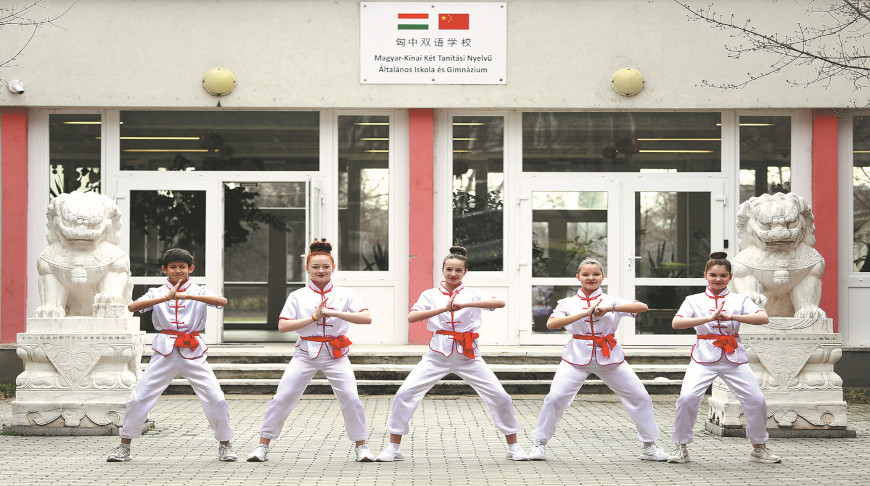
BEIJING, 10 May (BelTA - China Daily) - Erdelyi Zsuzsanna, principal of
the Hungarian-Chinese Bilingual School in Budapest, said she was so
excited to learn about Chinese President Xi Jinping's state visit to
Hungary.
Xi visited the school in October 2009 when he was Chinese vice-president. In early 2023, Xi replied to a letter from students of the school.
"The timing (of this visit) is so important because this year marks the 75th anniversary of the establishment of China-Hungary diplomatic relations, as well as the 20th anniversary of our school," said Erdelyi, who joined the school in 2004 when the school was founded. She became its principal in 2009.
She said the whole country is excited about Xi's visit and she believes the state visit will elevate the friendly relations between the two countries.
"The relations between Hungary and China have become better every day and the Hungarian media have news relating to China almost every day," she said, citing news about new Chinese investment and exhibitions.
"Hungarians can be immersed in Chinese culture without even leaving home."
Erdelyi received Xi at the school during his 2009 visit. She said the visit left a deep impression on her.
"At that time Xi had encouraged our students to become friendship envoys between China and Hungary," she said, adding that Xi's words had been a great encouragement for the school's faculty.
Before the Spring Festival of 2023, two 12th-grade students from the bilingual school, Varga Bonita (Chinese name Hu Lingyue) and Imre Tamara (Chinese name Song Zhixiao), in a letter to Xi and his wife Peng Liyuan, sent their Chinese New Year greetings on behalf of all students of the school.
In the letter, the two girls recounted their experience of studying Chinese in the school for 12 years and expressed their desire to study in Chinese universities and contribute to the friendship between Hungary and China.
Both of them are freshmen at the Capital Normal University in Beijing, studying how to teach Chinese to international students under a full scholarship.
A few days later, Xi replied to their letter, in which he said he still remembered having a chat with the school's teachers and students during his 2009 visit.
Xi said he wanted to give the students a thumbs-up for their efforts in learning the Chinese language and for their contributions to the China-Hungary friendship.
He said both China and Hungary have a long history and a rich culture, and the people of both countries enjoy traditional friendship and close cultural and people-to-people exchanges.
Xi said the students are welcome to study at Chinese universities after graduation from high school.
Xi hopes more Hungarian youths would love and study the Chinese language, have an opportunity to travel around China to learn more about the country and its history and culture, and strive to become envoys to develop the China-Hungary friendship.
"Imre and I decided to write to Grandpa Xi to express our gratitude and convey our Spring Festival greetings," Varga told the media after receiving Xi's reply.
The two students won the Chinese Ambassador Scholarship in January last year.
"Our dream is to be a translator. This letter will encourage us to continue working hard to study Chinese and become an excellent translator," Varga said.
Erdelyi, the principal, told China Daily that both students and teachers were overjoyed upon receiving President Xi's letter.
She said no one expected Xi to reply so soon since he has such a busy schedule.
"It's such a great encouragement," she said.
"It shows President Xi's care for the school and the importance he attaches to the Hungarian-Chinese ties."
Fostering enthusiasm
Erdelyi said Xi's reply had boosted the enthusiasm of students to learn the Chinese language and its culture.
Xi's letter was officially presented at the school on Feb 24, 2023, by Yang Chao, then-charge d'affaires of the Chinese embassy in Hungary.
Adam Stifter, deputy state secretary for the development of eastern relations at Hungary's Ministry of Foreign Affairs and Trade, attended the event.
He described it as one of the best examples of cultural and educational cooperation between Hungary and China.
He said that by learning the history and culture of the Chinese language, the students' knowledge will be enriched, contributing to the development of relations between the two countries.
Xi's letter has been exhibited in a meeting room of the bilingual school, while a group photo of Xi with the students during his 2009 visit hangs on a wall in the school's hallway.
It is the only full-time school in central and eastern Europe where students are taught in Chinese and the local language. Unlike other schools, students at the bilingual school are required to study three languages — Hungarian, Chinese and English.
"With their language advantage, our students can become better education and culture envoys," Erdelyi said, adding that learning Chinese means the students can help develop Chinese-Hungarian friendship.
She admitted learning Chinese was difficult for many students, especially writing the Chinese characters. If they persevere, they can master the language, she said.
"It will take time, patience and perseverance," she said.
"If they can master such a difficult language, then there is no other language they cannot master."
Erdelyi believes the increase in the number of Chinese investors in Hungary will provide her students with job opportunities since many Chinese-funded companies want to hire professionals who are familiar with the language.
"Our school is likely to become a 'reserve force' for those Chinese companies," she said.
Chen Yue, head of iFlytek Europe, a leading AI company in China, echoed her views.
The company has donated iFlytek dictionary pens to the school to help the students and is also providing full scholarships to students to study at the Anhui Institute of Information Technology based in Wuhu, Anhui province.
The company's European head office is based in Hungary, "so we want to contribute to our company's long-term future here as well as in the artificial intelligence sector in China and Hungary", he said.
"We also want to contribute to the friendship between Chinese and Hungarian people and to promote people-to-people exchanges," he said, adding that the bilingual school is a good choice for the company's full scholarship program.
Ferenczi Samuel, a 12th grader who has been granted iFlytek's full scholarship to study at the Anhui college, said he was excited to study in China.
Great opportunity
"It's a great opportunity," he said in Chinese. He said Chinese and Hungarian are among the most difficult languages to learn.
He plans to study AI at the Anhui school, saying he has always liked mathematics and computer science. And he knows iFlytek offers good jobs in AI.
"If I have China work experience, it will be easier for me to find a job back in Hungary," he said.
Sipos Bendeguz, another iFlytek's full scholarship winner, also plans to pursue studies in AI in China.
"I was always curious about China and its culture. I'm looking forward to studying in China," said Sipos, whose Chinese name is Gu Tianle. He shares his name with Hong Kong's famed actor Louis Koo Tin-Lok.
He admitted he will miss his home, friends and family in Budapest, especially his pets — four cats and a French bulldog.
A total of 10 of the bilingual school's 30 graduates will study in China this year on a full scholarship.
Besides iFlytek, many other companies have offered support. Bank of China Central and Eastern Europe Ltd, based in Budapest, has been making donations to the bilingual school for many years to help build its language lab, provide sports facilities, conduct Chinese language summer camps and reward students and teachers for excellence.
Chinese Ambassador to Hungary Gong Tao, who took up his role in September, has already visited the school three times, including granting the Chinese Ambassador Scholarship.
He invited Varga and Imre to the embassy early this year when they returned from China to visit their families during the school's winter vacation.
"I firmly believe that these youngsters who study Chinese will be the main force promoting China-Hungary friendship," Gong said.
Wang Yue is the representative of the Capital Normal University, the Chinese partner of the Confucius Classroom at the bilingual school. She said the cooperation between the Capital Normal University and the bilingual school is "very good".
The Confucius Classroom was officially inaugurated in 2017 as a partnership between the Capital Normal University and the Hungarian-Chinese Bilingual School.
"The students are quite interested in learning the Chinese language," said Wang, also a Chinese language teacher and a fluent Hungarian speaker who interpreted for China Daily during the interview with Erdelyi, who spoke Hungarian.
The school, where Chinese language class is mandatory, only had 87 students when it was founded in 2004. Now, it boasts 530 students and two-thirds of them are Hungarians.
"This shows the growing interest in learning Chinese," she said.
"The increasing numbers of Chinese language learners in Hungary and Hungarian students studying in China reflect the growing interest and appreciation for each other's culture and traditions," said Csizmadia Norbert, external director of Bank of China Central and Eastern Europe Ltd.
Erdelyi has visited China several times since her first visit in 2007, just a year before the Beijing Olympics.
"The city was changing every day and the construction of sports facilities was in full swing. And I felt how Chinese were looking forward to the sports extravaganza," she said.
She also visited many other Chinese cities.
"China is such a populous country compared to Hungary. But whichever city I visited, I saw the dedication to preserving its own traditional culture and history," Erdelyi said.
Xi visited the school in October 2009 when he was Chinese vice-president. In early 2023, Xi replied to a letter from students of the school.
"The timing (of this visit) is so important because this year marks the 75th anniversary of the establishment of China-Hungary diplomatic relations, as well as the 20th anniversary of our school," said Erdelyi, who joined the school in 2004 when the school was founded. She became its principal in 2009.
She said the whole country is excited about Xi's visit and she believes the state visit will elevate the friendly relations between the two countries.
"The relations between Hungary and China have become better every day and the Hungarian media have news relating to China almost every day," she said, citing news about new Chinese investment and exhibitions.
"Hungarians can be immersed in Chinese culture without even leaving home."
Erdelyi received Xi at the school during his 2009 visit. She said the visit left a deep impression on her.
"At that time Xi had encouraged our students to become friendship envoys between China and Hungary," she said, adding that Xi's words had been a great encouragement for the school's faculty.
Before the Spring Festival of 2023, two 12th-grade students from the bilingual school, Varga Bonita (Chinese name Hu Lingyue) and Imre Tamara (Chinese name Song Zhixiao), in a letter to Xi and his wife Peng Liyuan, sent their Chinese New Year greetings on behalf of all students of the school.
In the letter, the two girls recounted their experience of studying Chinese in the school for 12 years and expressed their desire to study in Chinese universities and contribute to the friendship between Hungary and China.
Both of them are freshmen at the Capital Normal University in Beijing, studying how to teach Chinese to international students under a full scholarship.
A few days later, Xi replied to their letter, in which he said he still remembered having a chat with the school's teachers and students during his 2009 visit.
Xi said he wanted to give the students a thumbs-up for their efforts in learning the Chinese language and for their contributions to the China-Hungary friendship.
He said both China and Hungary have a long history and a rich culture, and the people of both countries enjoy traditional friendship and close cultural and people-to-people exchanges.
Xi said the students are welcome to study at Chinese universities after graduation from high school.
Xi hopes more Hungarian youths would love and study the Chinese language, have an opportunity to travel around China to learn more about the country and its history and culture, and strive to become envoys to develop the China-Hungary friendship.
"Imre and I decided to write to Grandpa Xi to express our gratitude and convey our Spring Festival greetings," Varga told the media after receiving Xi's reply.
The two students won the Chinese Ambassador Scholarship in January last year.
"Our dream is to be a translator. This letter will encourage us to continue working hard to study Chinese and become an excellent translator," Varga said.
Erdelyi, the principal, told China Daily that both students and teachers were overjoyed upon receiving President Xi's letter.
She said no one expected Xi to reply so soon since he has such a busy schedule.
"It's such a great encouragement," she said.
"It shows President Xi's care for the school and the importance he attaches to the Hungarian-Chinese ties."
Fostering enthusiasm
Erdelyi said Xi's reply had boosted the enthusiasm of students to learn the Chinese language and its culture.
Xi's letter was officially presented at the school on Feb 24, 2023, by Yang Chao, then-charge d'affaires of the Chinese embassy in Hungary.
Adam Stifter, deputy state secretary for the development of eastern relations at Hungary's Ministry of Foreign Affairs and Trade, attended the event.
He described it as one of the best examples of cultural and educational cooperation between Hungary and China.
He said that by learning the history and culture of the Chinese language, the students' knowledge will be enriched, contributing to the development of relations between the two countries.
Xi's letter has been exhibited in a meeting room of the bilingual school, while a group photo of Xi with the students during his 2009 visit hangs on a wall in the school's hallway.
It is the only full-time school in central and eastern Europe where students are taught in Chinese and the local language. Unlike other schools, students at the bilingual school are required to study three languages — Hungarian, Chinese and English.
"With their language advantage, our students can become better education and culture envoys," Erdelyi said, adding that learning Chinese means the students can help develop Chinese-Hungarian friendship.
She admitted learning Chinese was difficult for many students, especially writing the Chinese characters. If they persevere, they can master the language, she said.
"It will take time, patience and perseverance," she said.
"If they can master such a difficult language, then there is no other language they cannot master."
Erdelyi believes the increase in the number of Chinese investors in Hungary will provide her students with job opportunities since many Chinese-funded companies want to hire professionals who are familiar with the language.
"Our school is likely to become a 'reserve force' for those Chinese companies," she said.
Chen Yue, head of iFlytek Europe, a leading AI company in China, echoed her views.
The company has donated iFlytek dictionary pens to the school to help the students and is also providing full scholarships to students to study at the Anhui Institute of Information Technology based in Wuhu, Anhui province.
The company's European head office is based in Hungary, "so we want to contribute to our company's long-term future here as well as in the artificial intelligence sector in China and Hungary", he said.
"We also want to contribute to the friendship between Chinese and Hungarian people and to promote people-to-people exchanges," he said, adding that the bilingual school is a good choice for the company's full scholarship program.
Ferenczi Samuel, a 12th grader who has been granted iFlytek's full scholarship to study at the Anhui college, said he was excited to study in China.
Great opportunity
"It's a great opportunity," he said in Chinese. He said Chinese and Hungarian are among the most difficult languages to learn.
He plans to study AI at the Anhui school, saying he has always liked mathematics and computer science. And he knows iFlytek offers good jobs in AI.
"If I have China work experience, it will be easier for me to find a job back in Hungary," he said.
Sipos Bendeguz, another iFlytek's full scholarship winner, also plans to pursue studies in AI in China.
"I was always curious about China and its culture. I'm looking forward to studying in China," said Sipos, whose Chinese name is Gu Tianle. He shares his name with Hong Kong's famed actor Louis Koo Tin-Lok.
He admitted he will miss his home, friends and family in Budapest, especially his pets — four cats and a French bulldog.
A total of 10 of the bilingual school's 30 graduates will study in China this year on a full scholarship.
Besides iFlytek, many other companies have offered support. Bank of China Central and Eastern Europe Ltd, based in Budapest, has been making donations to the bilingual school for many years to help build its language lab, provide sports facilities, conduct Chinese language summer camps and reward students and teachers for excellence.
Chinese Ambassador to Hungary Gong Tao, who took up his role in September, has already visited the school three times, including granting the Chinese Ambassador Scholarship.
He invited Varga and Imre to the embassy early this year when they returned from China to visit their families during the school's winter vacation.
"I firmly believe that these youngsters who study Chinese will be the main force promoting China-Hungary friendship," Gong said.
Wang Yue is the representative of the Capital Normal University, the Chinese partner of the Confucius Classroom at the bilingual school. She said the cooperation between the Capital Normal University and the bilingual school is "very good".
The Confucius Classroom was officially inaugurated in 2017 as a partnership between the Capital Normal University and the Hungarian-Chinese Bilingual School.
"The students are quite interested in learning the Chinese language," said Wang, also a Chinese language teacher and a fluent Hungarian speaker who interpreted for China Daily during the interview with Erdelyi, who spoke Hungarian.
The school, where Chinese language class is mandatory, only had 87 students when it was founded in 2004. Now, it boasts 530 students and two-thirds of them are Hungarians.
"This shows the growing interest in learning Chinese," she said.
"The increasing numbers of Chinese language learners in Hungary and Hungarian students studying in China reflect the growing interest and appreciation for each other's culture and traditions," said Csizmadia Norbert, external director of Bank of China Central and Eastern Europe Ltd.
Erdelyi has visited China several times since her first visit in 2007, just a year before the Beijing Olympics.
"The city was changing every day and the construction of sports facilities was in full swing. And I felt how Chinese were looking forward to the sports extravaganza," she said.
She also visited many other Chinese cities.
"China is such a populous country compared to Hungary. But whichever city I visited, I saw the dedication to preserving its own traditional culture and history," Erdelyi said.













